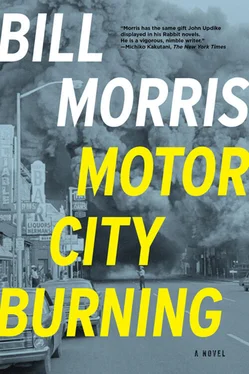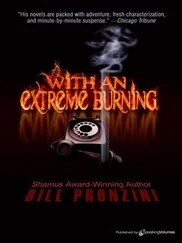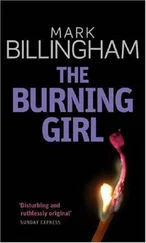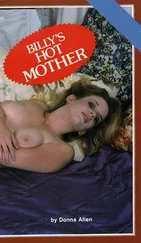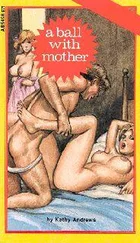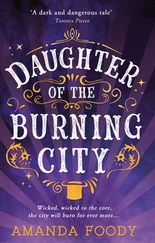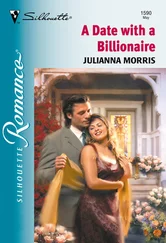Damn, Willie was thinking, the Tigers even had black ex-cons on their roster. His love for this team was growing deeper by the minute.
Gates Brown yanked the first pitch into the right-field corner and sauntered into second base with a double. Didn’t even break a sweat or get his uniform dirty. That took care of the hecklers. But the mention of prison had reminded Clyde of something.
“Du, check this out,” he said to Louis. “Got a call this morning from a client a mine, name of Alphonso Johnson. Po-lice woke him out of a dead sleep and hauled him downtown for questioning.”
“What for?”
“That’s the amazing thing — for an unsolved murder during the riot. That’s been almost a whole year ago. I didn’t know the D-troit po-lice worked on nothin for a year.”
“Ain’t a continental thing those fools do that surprises me no more. They get away with murder any day a the week they want to.”
“So did your client kill somebody?” Willie said.
Clyde shot him a withering look. “How the hell’m I suppose to know that, Alabama? You think a man kills somebody and goes around braggin on it?”
“No.”
“Hell no. I don’t know if he’s guilty and I don’t care. He’s my client. What I’m tryin to tell you is that the po-lice is still workin shit from the riot. That was news to me.”
It was news to Willie, too. The very worst news he could possibly have heard.
After the final out of the game, a 7–3 loss for the Tigers, Willie stood and took a last long look at the park, trying to commit it to memory. Then he followed Louis and Clyde and the rest of the hardcore fans down the switchbacks to the street. The two friends made plans to meet for Saturday’s game against the White Sox, and they asked Willie if he was planning to come.
“Depends on my work schedule,” he said. They posted the schedules on Thursdays, and there was a chance he would have to work on Saturday afternoon. “If I’ve got the day off I’ll definitely be here.”
“Here, Alabama,” Clyde said, handing him a business card. The embossed letters, gold on black, said Clyde Holland, Attorney at Law . Then Penobscot Building and a phone number. “A brother never knows when he’s gonna need a lawyer in this man’s town.”
“Amen,” Louis said.
“Thanks, Clyde.” Willie slipped the card into his wallet and said his goodbyes.
There was no sign of life at the hippie house on Plum Street, and his Buick was the only car left in the back yard. Driving up Cass, Willie tuned in WJLB and got the new one by Stevie Wonder, “You Met Your Match.” Great bass line and a nice jump to the beat, Willie thought, another sure hit for a kid who’d been cranking them out for years and wasn’t even out of his teens yet. Just thinking about Little Stevie Wonder made Willie feel old. Then came the signature sign-off of his favorite deejay, Ernie Durham, velvet-tongued “Ernie D,” who delivered his farewell over a drenched blue bed of horns: “I’m rough and I’m tough and I know my stuff. . and you’re lucky you live in a town where you can hear the Rockin’ Mr. D. before the sun goes down. . goodbye for now, D-troit, I LOVE ya! Now git yo’selves ready for Martha Jean the Queen!”
But Willie barely heard it. He couldn’t stop thinking about Clyde’s client getting hauled downtown for questioning in a murder from the riot, a murder that was nearly a year old. Willie realized he’d allowed himself to get lulled into a false sense of security. Just because the riot was ancient history didn’t mean the cops had forgotten about the last few unsolved murders. Far from it.
He realized the first thing he needed to do was get this Buick off the street. Again. It was the only thing that could possibly be his undoing. So instead of parking in his usual spot — out in the open at the curb near the corner of Pallister and Poe — he guided the Buick up the narrow driveway that ran between his apartment building and the scorched shell next door. He had to move some tires and old paint cans to make room in the garage. Then he pulled the Buick in and covered it with a tarp and closed the garage door.
He didn’t want to give the cops a thing. And he damn sure didn’t want to find out — from them or anyone else — exactly what had happened on the night he’d spent the past nine months trying to forget. But the world wouldn’t let him forget. It was like a stone in his guts — the killing guilt that lurked there, waiting to pounce if it turned out he had killed a woman in cold blood.
SATURDAY MORNING NOT QUITE TEN O’CLOCK AND FRANK DOYLE had the Homicide squad room to himself. The place was quiet, flushed with spring sunshine. If he didn’t know better, he might have believed the city of Detroit was at peace with itself.
When he sat down at his big ugly brown metal desk with the Free Press sports page and a fresh cup of forty-weight from the Bunn-O-Matic, the first thing Doyle noticed was the manila envelope in his IN box. It said INTEROFFICE and CONFIDENTIAL. That sounded promising, but before he could open it his telephone rang. Not even ten o’clock on a Saturday morning and already the calls had started coming. What was he thinking? This was Detroit. The calls never stopped coming.
Though he’d come in to clear up some paperwork and was, technically, off the clock, Doyle picked up the receiver. You never know. Police work is all about luck and squealers, and maybe this call would bring him luck. The good kind, for a change.
“Homicide, Doyle.” More than a year on the job and he still got a little jolt every time he heard himself say the words.
“Frankie, it’s Henry Hull calling from the Harlan House. Sorry to bother you on the weekend like this.”
“No problem, Mr. Hull. You know I’m always glad to hear from you.” It was true, sort of. Whenever Doyle heard that familiar squawk, his first thought was, The little bug-eyed bastard’s never going to give up, God bless him . Doyle put a smile in his voice and said, “Before we go on, Mr. Hull, I’ve got to tell you something. You’re the last person in the world who still calls me Frankie, and if you don’t knock it off I’m going to drop this investigation.”
“Hold on one minute, young fella. You drop this investigation and I’m going to report you to Sgt. Schroeder. You and your brother both.”
“Report us? For what?”
“Shoplifting. Every day on your way home from school you and Rod stopped by the market. I mighta been behind the meat counter but Helen was behind the cash register and old Hawkeye never missed a trick. Every day, she saw you pinch a Bazooka Joe bubble gum and your brother snagged a Tootsie Roll. Every day — for years.”
“You knew? Why didn’t you say anything?”
“Because the Doyles were good people. It doesn’t hurt a boy if he believes he’s slick — so long as he doesn’t take it too far. Which you and your brother didn’t do, obviously.”
The Hulls’ Greenleaf Market was the unofficial social hub of the Jefferson-Chalmers neighborhood, the place everyone went for bread and milk, for cigarettes and candy and gossip, to argue politics or talk sports. The Hulls were generous with credit, especially if a customer was visited by hardship, which was a regular occurrence in a city that lived and died with the boom-and-bust cycles of the auto industry. They were also, as Doyle had just learned, lenient with the right kind of shoplifters.
“Frankie, you’re not gonna believe it,” Henry said, “but I found something we missed!”
He was right. Doyle didn’t believe it because Henry left no stone unturned. For the past nine months he’d been amassing a small mountain of evidence in a fourth-floor room at the Harlan House Motel on West Grand Boulevard at the John Lodge Freeway, where Henry now lived and where his wife had died on the morning of July 26, 1967, with a single.30-caliber bullet from a sniper’s rifle lodged in her liver.
Читать дальше
